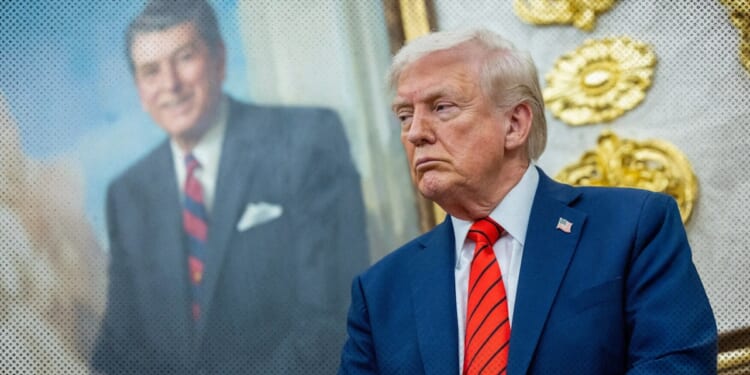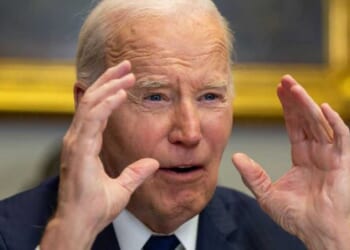Free trade Republicans and Democrats have tried in desperation to find a way to turn Americans against President Donald Trump’s tariffs. Now, the Canadians have jumped on the bandwagon.
The government of Ontario recently aired a television ad during the World Series featuring the Gipper himself, Ronald Reagan, in which the former president gave a speech opposing tariffs.
After imposing higher tariffs this year and even threatening tongue-in-cheek to annex Canada, President Trump was bound to feel some political heat from our northern neighbors. Trump was quick to rebuke the ad, suspending trade talks with Canada and claiming the ad was a false representation of Reagan’s policies. He quickly raised tariffs on Canadian goods by 10%.
Political analysts from all sides circled the wagons to claim Reagan waved the flag of free trade and would oppose all of Trump’s tariffs. In the ensuing uproar on social media and among the talkingheads of news networks, even the Ronald Reagan Presidential Foundation & Institute criticized the ad as a misrepresentation.
That didn’t stop Trump’s opponents from painting the president as a protectionist and warning that his aggressive tariffs would hurt the economy and possibly lead to another depression in the vein of the Smoot-Hawley tariffs of 1930.
The editorial board of The Wall Street Journal opined, “It’s a shame to see the Reagan Foundation, of all places, indulging Mr. Trump’s pique with its statement saying the speech was taken out of context. Anyone who reads the whole speech can see the Gipper favored free trade, with rare exceptions for political pragmatism and national security. Reagan also backed, long before NAFTA, a North American free-trade area.”
Trump’s foes cherry-picked a speech by Reagan to make their case about tariffs directly, but also to call into question Trump’s ascension as the standard-bearer of the Republican Party. But in reality, Reagan made exceptions to the free trade philosophy and realized free trade only works when both sides play fair. Like Trump, Reagan knew free trade wasn’t always free or fair.
Pepperdine University Professor Steven Hayward writes, “Strict libertarians and ardent free traders have long criticized Reagan for what they perceived as hypocrisy on trade, as he instigated or signed off on numerous protectionist measures throughout his presidency, starting with his first months in office in 1981. During this period, he persuaded Japan to adopt significant ‘voluntary’ automobile import restraints, which remained in effect until 1985.”
Hayward adds, “Reagan also secured agreements from several European and Latin American nations to adopt similar ‘voluntary’ quotas on steel exports to the U.S. Additionally, Reagan imposed protectionist measures on textiles, specialty steel, Canadian wood products, Italian pasta, motorcycles, and even mushrooms during his two terms. In 1986, Reagan threatened to impose a 200 percent tariff on Spain for its restrictions on U.S. grain imports.”
Sounds a lot like Trump, doesn’t it?
Another important thing to keep in mind when analyzing a selective clip from Reagan’s speech is that America in the 1980s was far different in many ways compared to 2025. Then, many goods were still produced in the U.S., and the abandonment of American workers in favor of cheap labor overseas was just underway. Now, America’s factories lie in ruins due to so-called free-trade policies that were only free to those exporting goods to the U.S.
This likely accounts for Trump’s flexibility on tariffs, boldly announcing high tariffs one day and then being willing to negotiate terms the next. The end goal for Trump has always been to ensure trade deals benefit American interests, not to proclaim tariffs as a solution to all our economic ills (even if he does put it that way in his usual hyperbole). He’s not a protectionist, but a realist making the best of a dire situation.
The free-traders have become like the war hawks. If you dare question why we’re going to war, you’re an isolationist. Likewise, if you criticize free trade, you’re a protectionist. Free trade has become a religion led by the globalists.
As economics professor John M. Culbertson writes at the Harvard Business Review, “Today the evidence should be clear to anyone who wants to look at it: our blind allegiance to free trade threatens our national standard of living and our economic future. By sacrificing our home market on the altar of free trade, we are condemning ourselves and our children to a future of fewer competitive businesses, fewer good jobs, less opportunity, and a lower standard of living. These unacceptable outcomes threaten us in ways that are all related to our practice of free trade.”
In reality, Trump shares Reagan’s objective of making sure America is treated fairly in trade negotiations. One wonders whether Reagan would have remained a free trader after seeing the gutting of American manufacturing and the outsourcing of jobs — if he had known free trade would be so costly.
The attempt to characterize Reagan as a free trader and Trump as a protectionist distorts the records and intentions of both presidents. Like Reagan, Trump believes any trade deal should put America first, not those who use free trade to undermine our interests.
















